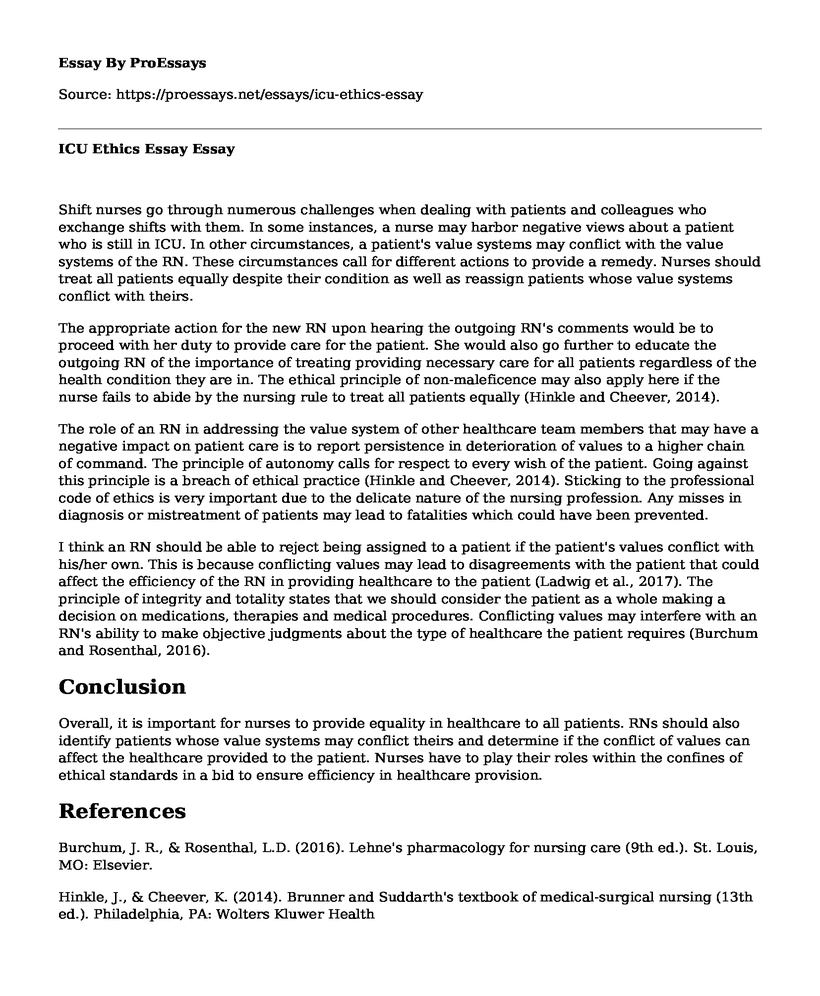Shift nurses go through numerous challenges when dealing with patients and colleagues who exchange shifts with them. In some instances, a nurse may harbor negative views about a patient who is still in ICU. In other circumstances, a patient's value systems may conflict with the value systems of the RN. These circumstances call for different actions to provide a remedy. Nurses should treat all patients equally despite their condition as well as reassign patients whose value systems conflict with theirs.
The appropriate action for the new RN upon hearing the outgoing RN's comments would be to proceed with her duty to provide care for the patient. She would also go further to educate the outgoing RN of the importance of treating providing necessary care for all patients regardless of the health condition they are in. The ethical principle of non-maleficence may also apply here if the nurse fails to abide by the nursing rule to treat all patients equally (Hinkle and Cheever, 2014).
The role of an RN in addressing the value system of other healthcare team members that may have a negative impact on patient care is to report persistence in deterioration of values to a higher chain of command. The principle of autonomy calls for respect to every wish of the patient. Going against this principle is a breach of ethical practice (Hinkle and Cheever, 2014). Sticking to the professional code of ethics is very important due to the delicate nature of the nursing profession. Any misses in diagnosis or mistreatment of patients may lead to fatalities which could have been prevented.
I think an RN should be able to reject being assigned to a patient if the patient's values conflict with his/her own. This is because conflicting values may lead to disagreements with the patient that could affect the efficiency of the RN in providing healthcare to the patient (Ladwig et al., 2017). The principle of integrity and totality states that we should consider the patient as a whole making a decision on medications, therapies and medical procedures. Conflicting values may interfere with an RN's ability to make objective judgments about the type of healthcare the patient requires (Burchum and Rosenthal, 2016).
Conclusion
Overall, it is important for nurses to provide equality in healthcare to all patients. RNs should also identify patients whose value systems may conflict theirs and determine if the conflict of values can affect the healthcare provided to the patient. Nurses have to play their roles within the confines of ethical standards in a bid to ensure efficiency in healthcare provision.
References
Burchum, J. R., & Rosenthal, L.D. (2016). Lehne's pharmacology for nursing care (9th ed.). St. Louis, MO: Elsevier.
Hinkle, J., & Cheever, K. (2014). Brunner and Suddarth's textbook of medical-surgical nursing (13th ed.). Philadelphia, PA: Wolters Kluwer Health
Ladwig, G., Ackley, B., & Makic, M. (2017). Mosby's guide to nursing diagnosis (5th ed.). St. Louis, MO: Elsevier.
Cite this page
ICU Ethics Essay. (2022, May 09). Retrieved from https://proessays.net/essays/icu-ethics-essay
If you are the original author of this essay and no longer wish to have it published on the ProEssays website, please click below to request its removal:
- The Effects of Leber's Hereditary Optic Neuropathy
- The Webinar the Road to Elder Care Paper Example
- Autoimmune Disease: Myasthenia Gravis Paper Example
- Essay Sample on Mental Illness in the Community
- Essay Sample on Management of the Centre for Diseases Control Organization (CDC)
- Paper Example on Doctors & Patients: Meeting Challenges in Treatment through Technology
- Differences in COPD Care: Hospital vs. Home Preferences & Satisfaction Essay Example







